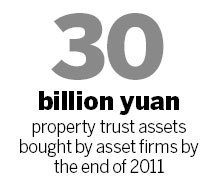
China is preparing to formally allow asset-management companies to buy bad assets of property trusts.
The move comes as the country attempts to absorb the rising defaults of property projects due to policy curbs and a capital shortage.
The China Banking Regulatory Commission is drafting a guideline on the bad-asset purchases, the Shanghai Securities News reported on Tuesday.
The banking watchdog also warned asset companies to pay close attention to changes in the economic situation and industrial policies, especially real estate policies.
And they should purchase the nonperforming assets of real estate trust businesses "prudently", to ensure that the speed of their business expansion matches their internal-control capabilities, it said.
Acquisition of trust companies' bad assets by asset companies has been growing very fast, and was mostly concentrated in real estate-related industries, which would easily lead to higher risks, the newspaper cited a source at the CBRC as saying.
By the end of 2011, asset companies had already bought property trust assets valued at up to 30 billion yuan ($4.7 billion), it reported.

"Actually, without the CBRC's guidelines, in practice there is little preventing asset companies from buying such bad assets, as far as I know," said a manager at Citic Trust, who declined to be named, citing company policy.
He said such a purchase is one of the measures to counter risks related to the real estate market. Others include selling fund products with less-rigid payment requirements, and issuing new trust products to supplement capital for those property companies to repay the money.
According to the manager, property trusts are a fifth of the total entrusted assets, excluding trust products sold through banks.
"Risks in property trusts have loomed large as defaults are reported constantly. But now the industry is not that worried about such risks as we find many ways to solve the problem and digest such bad assets gradually," the manager said
Although the CBRC is legalizing purchases of bad assets related to property trusts, it has also drafted guidelines for the purchases to lower the risk. For example, asset companies are warned to stay away from projects with insufficient capital support an unclear sale prospects.
In addition, the asset companies cannot provide loans or other forms of financing to companies trapped in debt, and should avoid over-dependence on revenue from a certain industry and region, according to the newspaper.
The CBRC declined to comment when contacted by China Daily.
Asset companies have been eager to buy bad property-trust assets in the past two years as the authorities try to cool the real estate market. The 21st Century Business Herald reported earlier last week that the revenue contribution related to such purchases has exceeded 70 percent.
Outstanding property trusts stood at 695.3 billion yuan by the end of June, said Ke Kasheng, head of the CBRC's non-bank financial institution, said earlier at a forum in Beijing.
The redemption of trusts will reach 71 billion yuan this year and 184.2 billion yuan in 2013, he said.
"But potential risks in certain projects invested by real estate trusts are not likely to cause regional or systemic troubles," Ke said.
Property trusts' financing accounted for only 6.1 percent of the total banking funds of the property sector and 12.6 percent of the entrusted assets of Chinese trust companies, Ke said.
Cai Xiao contributed to this story.
wangxiaotian@chinadaily.com.cn
(China Daily 08/22/2012 page14)







